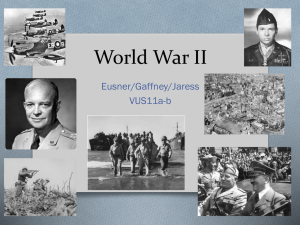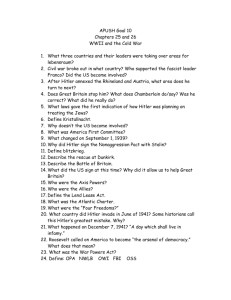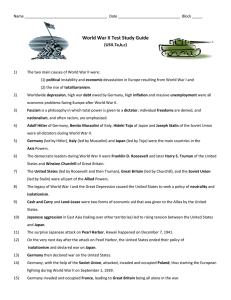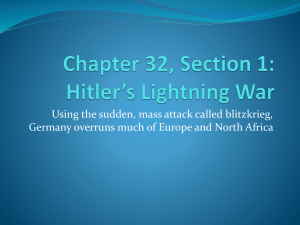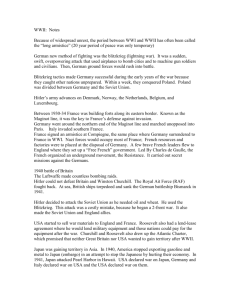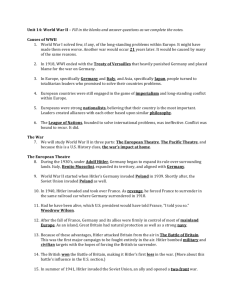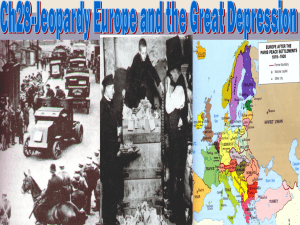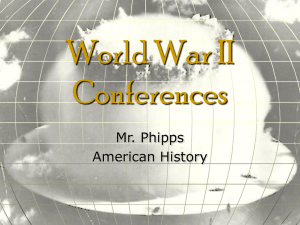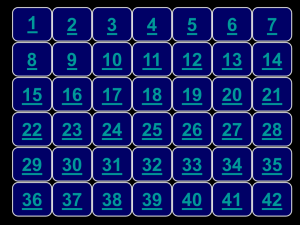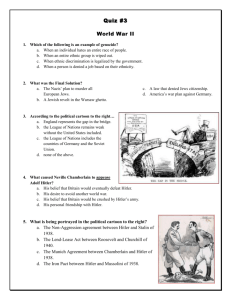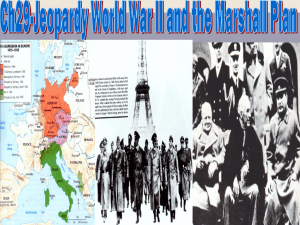World War II
advertisement
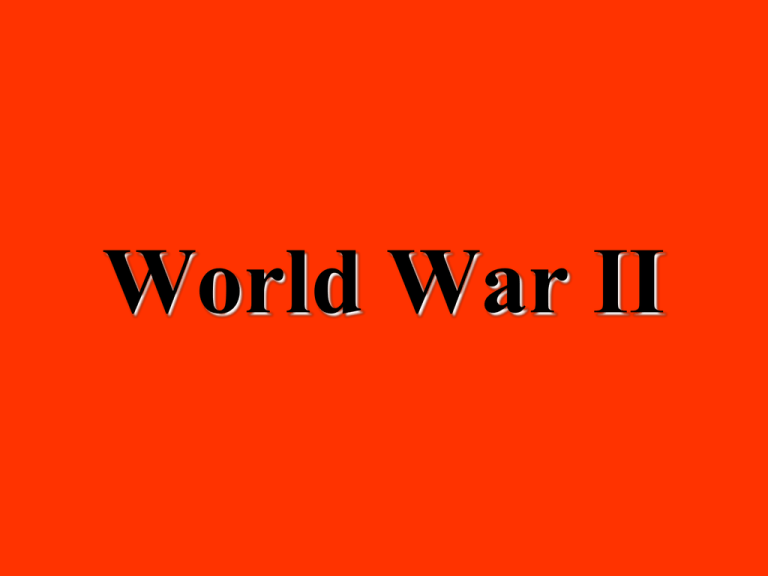
World War II Who was president during World War II? • Franklin D. Roosevelt What event started World War II ? •Hitler invaded Poland. What did the Soviet Union do when Hitler invaded Poland? • Invaded Poland and the Baltic countries from the east What were the Axis nations during World War II? • Germany • Italy • Japan What happened to France in the first two years of World War II? • France was overrun by Germany. What was the Battle of Britain? • Hitler’s air attack on Great Britain What country did Hitler invade in mid-1941? • The Soviet Union What was the position of the United States during the first two years of World War II? • Neutral What foreign policy had strong support in the United States during the first two years of World War II? • Isolationism Despite its official position of neutrality, how did the United States increasingly help Great Britain? • Gave Great Britain war supplies and old naval warships in exchange for military bases in Bermuda and the Caribbean Sea What caused America’s gradual abandonment of its policy of neutrality? • Between 1939 and mid-1941, Germany overran France and most of Europe, pounded Great Britain by air in the Battle of Britain, and invaded the Soviet Union. Identify the Lend-Lease Act. • A law that gave the President authority to sell, lease, or lend military equipment to countries to defend themselves against the Axis powers Who compared the Lend-Lease Act to “lending a garden hose to a next-door neighbor whose house is on fire”? • President Franklin Roosevelt How did America’s policy towards Japan change after the Japanese invaded Manchuria and China during the thirties? • U.S. refused to recognize Japanese conquests in Asia. • U.S. imposed an embargo on exports of oil and steel to Japan. What event brought the U.S. into World War II? •Japanese attack on Pearl Harbor Who called the Japanese attack on Pearl Harbor on December 7, 1941 “a date that will live in infamy”? • President Franklin D. Roosevelt Who was the leader of Germany during World War II? • Adolf Hitler Who were the Allies in World War II? • Great Britain • the Soviet Union • the United States Who was the leader of Great Britain during World War II? •Winston Churchill Who was the leader of the Soviet Union during World War II? •Joseph Stalin What strategy did the Allies follow? •Defeat Hitler First In what battle in North Africa did the British defeat German forces, thereby denying Hitler control over the Middle Eastern oil fields and preventing Hitler from attacking the Soviet Union from the south? •El Alamein What happened at the Battle of Stalingrad? • Soviet army defeated the Germans • Prevented the Germans from seizing the Soviet oil fields • Turned the tide against the Germans on the eastern front What happened at the Normandy landings (D-Day)? • American and Allied troops landed in France. • Liberation of Western Europe had begun. • It was the turning point of the war on the western front. Who was the commander of the Allied forces at the DDay invasion? • Dwight D. Eisenhower What was the turning point of the war in the Pacific? •The Battle of Midway What was the Allied strategy in the Pacific? •Island hopping The invasions of what two Pacific islands brought American forces closer to Japan? •Iwo Jima •Okinawa How did the United States end the war in the Pacific? • Dropped atomic bombs on Hiroshima and Nagasaki During World War II, when men left the factories to serve in the armed forces, who often took their jobs? •Women What image represented American women who worked in factories during World War II? • Rosie the Riveter What became the slogan of African-Americans on the home front during World War II? • Victory in war and equality at home Were the United States armed forces racially segregated during World War II? •Yes During World War II, what group of African-American flyers served with distinction in Europe? •The Tuskegee Airmen During World War II, what Japanese-American regiments earned a high number of decorations for bravery? •Nisei regiments What Native American language was used by the U.S. military during World War II for communication codes in the Pacific? •Navajo What international agreement established rules for the humane treatment of prisoners of war? • The Geneva Convention What happened on the Bataan Death March? • American POWs in the Philippines suffered brutal treatment by the Japanese How did the treatment of prisoners of war in Europe differ from that in the Pacific? • The treatment of prisoners of war in Europe more closely followed the ideas of the Geneva Convention. What is genocide? • The systematic and purposeful destruction of a racial, political, or cultural group What was the Holocaust? • Nazi Germany’s systematic murder of European Jews. What was Hitler’s “final solution?” • Exterminate (kill) all the Jews in Europe Besides Jews, what other groups were victims of the Holocaust? • Poles • Slavs • Gypsies • “Undesirables” defined by the Nazis as homosexuals, the mentally ill, and political dissidents (protesters) What were the Nuremberg Trials? • Trials of Nazi leaders for war crimes What was the short-term significance of the Holocaust? • In the Nuremberg trials, Nazi leaders and others were convicted of war crimes. What was the long-term significance of the Holocaust? • The Nuremberg trials emphasized individual responsibility for actions during a war, regardless of orders received. • The Nuremberg trials led to increased demand for a Jewish homeland. In 1948 what nation was founded by Jewish settlers living in Palestine? •Israel How did the U.S. maintain an adequate supply of products for the war effort? • Rationing: each family received a monthly allowance of essential items (sugar, gasoline, meat) How did the Roosevelt administration finance World War II? • War bonds • The federal income tax What African-American leader led the fight for desegregation of the armed forces and equal hiring in defense jobs. • A. Philip Randolph What was the Selective Service Act? • 1940 law which established the first peacetime draft in American history What happened to most Japanese-Americans during World War II? • Relocated to internment camps, where they were required to stay until the end of the war What were two reasons for the internment of JapaneseAmericans during World War II? • Strong anti-Japanese prejudice on the West Coast • False belief that JapaneseAmericans were aiding the enemy How did the Supreme Court rule in Korematsu v. United States? • Upheld the government’s right to act against JapaneseAmericans living on the West Coast • Upheld the Roosevelt administration’s policy of placing Japanese-Americans in internment camps, because of fears they might assist in a Japanese invasion What was the role of the American media and entertainment industries during World War II? • Promoted Nationalism Define nationalism. • A strong feeling of patriotism or devotion to one’s country In what three ways did media and communications assist the Allied efforts during World War II? • 1) The United States government maintained strict censorship of the reporting of the war. • 2) Public morale and ad campaigns kept Americans focused on the war effort. • 3) The entertainment industry produced movies, plays, and shows that boosted morale and patriotic support for the war effort as well as portrayed the enemy in stereotypical ways.
